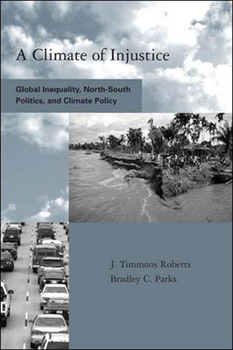A Climate of Injustice: Global Inequality, North-South Politics, and Climate Policy
(Part of the Global Environmental Accord: Strategies for Sustainability and Institutional Innovation Series)
Select Format
Select Condition 
Book Overview
The global debate over who should take action to address climate change is extremely precarious, as diametrically opposed perceptions of climate justice threaten the prospects for any long-term agreement. Poor nations fear limits on their efforts to grow economically and meet the needs of their own people, while powerful industrial nations, including the United States, refuse to curtail their own excesses unless developing countries make similar sacrifices. Meanwhile, although industrialized countries are responsible for 60 percent of the greenhouse gas emissions that contribute to climate change, developing countries suffer the "worst and first" effects of climate-related disasters, including droughts, floods, and storms, because of their geographical locations. In A Climate of Injustice, J. Timmons Roberts and Bradley Parks analyze the role that inequality between rich and poor nations plays in the negotiation of global climate agreements.
Roberts and Parks argue that global inequality dampens cooperative efforts by reinforcing the "structuralist" worldviews and causal beliefs of many poor nations, eroding conditions of generalized trust, and promoting particularistic notions of "fair" solutions. They develop new measures of climate-related inequality, analyzing fatality and homelessness rates from hydrometeorological disasters, patterns of "emissions inequality," and participation in international environmental regimes. Until we recognize that reaching a North-South global climate pact requires addressing larger issues of inequality and striking a global bargain on environment and development, Roberts and Parks argue, the current policy gridlock will remain unresolved.
Format:Paperback
Language:English
ISBN:0262681617
ISBN13:9780262681612
Release Date:November 2006
Publisher:MIT Press
Length:404 Pages
Weight:1.30 lbs.
Dimensions:0.8" x 6.3" x 9.0"
Age Range:18 years and up
Grade Range:Postsecondary and higher
Customer Reviews
0 rating





